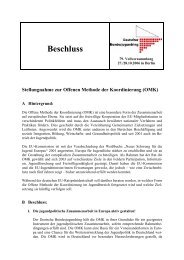National Quality Standards Framework (NQSF) - Homeless Agency
National Quality Standards Framework (NQSF) - Homeless Agency
National Quality Standards Framework (NQSF) - Homeless Agency
Create successful ePaper yourself
Turn your PDF publications into a flip-book with our unique Google optimized e-Paper software.
3.3 <strong>Standards</strong> 3.3.7 Strategy Section 2: Organisational Management and Development<br />
Youth work providers have a sustainable strategic plan that informs the direction and delivery of youth work.<br />
The indicators below describe what should be in place in support of this standard at each point along the scale of attainment. Please consider these indicators in relation to your organisation and<br />
insert P beside the appropriate indicator. You may add any other indicators you think are appropriate.<br />
Absent<br />
P Acquiring P Achieved P Advanced P<br />
1. No overall strategic plan is in place or<br />
being developed.<br />
2. Strategies for the work exist, but are<br />
undocumented.<br />
3. Strategies have developed with no regard<br />
to consultation.<br />
4. Strategies are not based on clear rationale<br />
and do not lead to outcomes.<br />
5. Voluntary and paid management do not<br />
provide leadership to the organisation.<br />
6. Strategies in place are unsustainable and<br />
provide no guidance or direction.<br />
7. Strategies have no regard to practice or<br />
service development.<br />
Add any other indicators below:<br />
1. Overall strategic plan is being developed. 1. Overall strategic plan is implemented. 1. Overall strategic plan is effectively<br />
implemented and actions achieved.<br />
2. Strategies for the work exist and are<br />
mostly documented.<br />
3. Strategies have been developed based on<br />
limited consultation.<br />
4. Strategies are mostly based on clear<br />
rationale and lead to the achievement of<br />
some outcomes.<br />
5. Voluntary and paid management aim to<br />
provide leadership to the organisation.<br />
6. Strategies in place are mostly sustainable<br />
and provide some guidance and direction.<br />
7. Strategies indirectly inform practice and<br />
service development.<br />
2. Strategies for the work are implemented<br />
and documented.<br />
3. Strategies have been developed based on<br />
consultation.<br />
4. Strategies in place are based on clear<br />
rationale and lead to the achievement of<br />
most outcomes.<br />
5. Voluntary and paid management provide<br />
leadership to the organisation.<br />
6. Strategies in place are sustainable and<br />
provide guidance and direction.<br />
7. Strategies directly inform practice and<br />
service development.<br />
2. Strategies for the work are fully<br />
implemented, documented and reviewed.<br />
3. Strategies have been developed based on<br />
consultation and participation.<br />
4. Strategies in place are based on clear<br />
rationale and lead to the achievement of<br />
all outcomes.<br />
5. Voluntary and paid management actively<br />
provide leadership to the organisation.<br />
6. Strategies in place are sustainable and<br />
provide guidance, direction and purpose.<br />
7. Strategies enhance practice and service<br />
development, and are being achieved.<br />
27<br />
In the relevant spaces below, please describe the evidence your organisation has in place in relation to the above indicators:<br />
Having considered the above, identify a position on the scale of attainment that best reflects your organisation’s position in relation to this standard (mark P on a point on the scale below).<br />
If you think your organisation is at different points on the scale of attainment in relation to the various indicators, choose a point on the scale that, overall, best reflects this position.<br />
Absent Acquiring Achieved Advanced<br />
Why have you chosen this point on the scale?
















